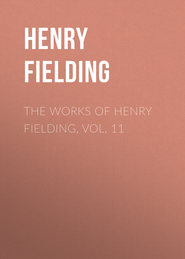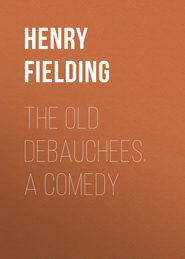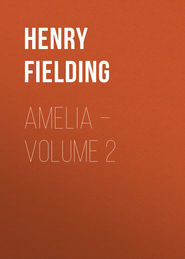По всем вопросам обращайтесь на: info@litportal.ru
(©) 2003-2024.
✖
Amelia – Complete
Настройки чтения
Размер шрифта
Высота строк
Поля
“First, madam, let me beg one favour,” cried he: “consider it is the last, and then I shall die in peace – let me kiss that hand before I die.”
“Well, nay,” says she, “I don’t know what I am doing – well – there.” She then carelessly gave him her hand, which he put gently to his lips, and then presently let it drop, and fell back in the bed.
Amelia now summoned Mrs. Atkinson, who was indeed no further off than just without the door. She then hastened down-stairs, and called for a great glass of water, which having drank off, she threw herself into a chair, and the tears ran plentifully from her eyes with compassion for the poor wretch she had just left in his bed.
To say the truth, without any injury to her chastity, that heart, which had stood firm as a rock to all the attacks of title and equipage, of finery and flattery, and which all the treasures of the universe could not have purchased, was yet a little softened by the plain, honest, modest, involuntary, delicate, heroic passion of this poor and humble swain; for whom, in spite of herself, she felt a momentary tenderness and complacence, at which Booth, if he had known it, would perhaps have been displeased.
Having staid some time in the parlour, and not finding Mrs. Atkinson come down (for indeed her husband was then so bad she could not quit him), Amelia left a message with the maid of the house for her mistress, purporting that she should be ready to do anything in her power to serve her, and then left the house with a confusion on her mind that she had never felt before, and which any chastity that is not hewn out of marble must feel on so tender and delicate an occasion.
Chapter vii. – In which Mr. Booth meets with more than one adventure
Booth, having hunted for about two hours, at last saw a young lady in a tattered silk gown stepping out of a shop in Monmouth – street into a hackney-coach. This lady, notwithstanding the disguise of her dress, he presently discovered to be no other than little Betty.
He instantly gave the alarm of stop thief, stop coach! upon which Mrs. Betty was immediately stopt in her vehicle, and Booth and his myrmidons laid hold of her.
The girl no sooner found that she was seised by her master than the consciousness of her guilt overpowered her; for she was not yet an experienced offender, and she immediately confessed her crime.
She was then carried before a justice of peace, where she was searched, and there was found in her possession four shillings and sixpence in money, besides the silk gown, which was indeed proper furniture for rag-fair, and scarce worth a single farthing, though the honest shopkeeper in Monmouth-street had sold it for a crown to the simple girl.
The girl, being examined by the magistrate, spoke as follows: – “Indeed, sir, an’t please your worship, I am very sorry for what I have done; and to be sure, an’t please your honour, my lord, it must have been the devil that put me upon it; for to be sure, please your majesty, I never thought upon such a thing in my whole life before, any more than I did of my dying-day; but, indeed, sir, an’t please your worship – ”
She was running on in this manner when the justice interrupted her, and desired her to give an account of what she had taken from her master, and what she had done with it.
“Indeed, an’t please your majesty,” said she, “I took no more than two shifts of madam’s, and I pawned them for five shillings, which I gave for the gown that’s upon my back; and as for the money in my pocket, it is every farthing of it my own. I am sure I intended to carry back the shifts too as soon as ever I could get money to take them out.”
The girl having told them where the pawnbroker lived, the justice sent to him, to produce the shifts, which he presently did; for he expected that a warrant to search his house would be the consequence of his refusal.
The shifts being produced, on which the honest pawnbroker had lent five shillings, appeared plainly to be worth above thirty; indeed, when new they had cost much more: so that, by their goodness as well as by their size, it was certain they could not have belonged to the girl. Booth grew very warm against the pawnbroker. “I hope, sir,” said he to the justice, “there is some punishment for this fellow likewise, who so plainly appears to have known that these goods were stolen. The shops of these fellows may indeed be called the fountains of theft; for it is in reality the encouragement which they meet with from these receivers of their goods that induces men very often to become thieves, so that these deserve equal if not severer punishment than the thieves themselves.”
The pawnbroker protested his innocence, and denied the taking in the shifts. Indeed, in this he spoke truth, for he had slipt into an inner room, as was always his custom on these occasions, and left a little boy to do the business; by which means he had carried on the trade of receiving stolen goods for many years with impunity, and had been twice acquitted at the Old Bailey, though the juggle appeared upon the most manifest evidence.
As the justice was going to speak he was interrupted by the girl, who, falling upon her knees to Booth, with many tears begged his forgiveness.
“Indeed, Betty,” cries Booth, “you do not deserve forgiveness; for you know very good reasons why you should not have thought of robbing your mistress, particularly at this time. And what further aggravates your crime is, that you robbed the best and kindest mistress in the world. Nay, you are not only guilty of felony, but of a felonious breach of trust, for you know very well everything your mistress had was intrusted to your care.”
Now it happened, by very great accident, that the justice before whom the girl was brought understood the law. Turning therefore to Booth, he said, “Do you say, sir, that this girl was intrusted with the shifts?”
“Yes, sir,” said Booth, “she was intrusted with everything.”
“And will you swear that the goods stolen,” said the justice, “are worth forty shillings?”
“No, indeed, sir,” answered Booth, “nor that they are worthy thirty either.”
“Then, sir,” cries the justice, “the girl cannot be guilty of felony.”
“How, sir,” said Booth, “is it not a breach of trust? and is not a breach of trust felony, and the worst felony too?”
“No, sir,” answered the justice; “a breach of trust is no crime in our law, unless it be in a servant; and then the act of parliament requires the goods taken to be of the value of forty shillings.”
“So then a servant,” cries Booth, “may rob his master of thirty-nine shillings whenever he pleases, and he can’t be punished.”
“If the goods are under his care, he can’t,” cries the justice.
“I ask your pardon, sir,” says Booth. “I do not doubt what you say; but sure this is a very extraordinary law.”
“Perhaps I think so too,” said the justice; “but it belongs not to my office to make or to mend laws. My business is only to execute them. If therefore the case be as you say, I must discharge the girl.”
“I hope, however, you will punish the pawnbroker,” cries Booth.
“If the girl is discharged,” cries the justice, “so must be the pawnbroker; for, if the goods are not stolen, he cannot be guilty of receiving them knowing them to be stolen. And, besides, as to his offence, to say the truth, I am almost weary of prosecuting it; for such are the difficulties laid in the way of this prosecution, that it is almost impossible to convict any one on it. And, to speak my opinion plainly, such are the laws, and such the method of proceeding, that one would almost think our laws were rather made for the protection of rogues than for the punishment of them.”
Thus ended this examination: the thief and the receiver went about their business, and Booth departed in order to go home to his wife.
In his way home Booth was met by a lady in a chair, who, immediately upon seeing him, stopt her chair, bolted out of it, and, going directly up to him, said, “So, Mr. Booth, you have kept your word with me.”
The lady was no other than Miss Matthews, and the speech she meant was of a promise made to her at the masquerade of visiting her within a day or two; which, whether he ever intended to keep I cannot say, but, in truth, the several accidents that had since happened to him had so discomposed his mind that he had absolutely forgot it.
Booth, however, was too sensible and too well-bred to make the excuse of forgetfulness to a lady; nor could he readily find any other. While he stood therefore hesitating, and looking not over-wise, Miss Matthews said, “Well, sir, since by your confusion I see you have some grace left, I will pardon you on one condition, and that is that you will sup with me this night. But, if you fail me now, expect all the revenge of an injured woman.” She then bound herself by a most outrageous oath that she would complain to his wife – “And I am sure,” says she, “she is so much a woman of honour as to do me justice. And, though I miscarried in my first attempt, be assured I will take care of my second.”
Booth asked what she meant by her first attempt; to which she answered that she had already writ his wife an account of his ill-usage of her, but that she was pleased it had miscarried. She then repeated her asseveration that she would now do it effectually if he disappointed her.
This threat she reckoned would most certainly terrify poor Booth; and, indeed, she was not mistaken; for I believe it would have been impossible, by any other menace or by any other means, to have brought him once even to balance in his mind on this question. But by this threat she prevailed; and Booth promised, upon his word and honour, to come to her at the hour she appointed. After which she took leave of him with a squeeze by the hand, and a smiling countenance, and walked back to her chair.
But, however she might be pleased with having obtained this promise, Booth was far from being delighted with the thoughts of having given it. He looked, indeed, upon the consequences of this meeting with horrour; but as to the consequence which was so apparently intended by the lady, he resolved against it. At length he came to this determination, to go according to his appointment, to argue the matter with the lady, and to convince her, if possible, that, from a regard to his honour only, he must discontinue her acquaintance. If this failed to satisfy her, and she still persisted in her threats to acquaint his wife with the affair, he then resolved, whatever pains it cost him, to communicate the whole truth himself to Amelia, from whose goodness he doubted not but to obtain an absolute remission.
Chapter viii. – In which Amelia appears in a light more amiable than gay
We will now return to Amelia, whom we left in some perturbation of mind departing from Mrs. Atkinson.
Though she had before walked through the streets in a very improper dress with Mrs. Atkinson, she was unwilling, especially as she was alone, to return in the same manner. Indeed, she was scarce able to walk in her present condition; for the case of poor Atkinson had much affected her tender heart, and her eyes had overflown with many tears.
It occurred likewise to her at present that she had not a single shilling in her pocket or at home to provide food for herself and her family. In this situation she resolved to go immediately to the pawnbroker whither she had gone before, and to deposit her picture for what she could raise upon it. She then immediately took a chair and put her design in execution.
The intrinsic value of the gold in which this picture was set, and of the little diamonds which surrounded it, amounted to nine guineas. This therefore was advanced to her, and the prettiest face in the world (such is often the fate of beauty) was deposited, as of no value, into the bargain.
When she came home she found the following letter from Mrs. Atkinson: —
“MY DEAREST MADAM, – As I know your goodness, I could not delay a moment acquainting you with the happy turn of my affairs since you went. The doctor, on his return to visit my husband, has assured me that the captain was on the recovery, and in very little danger; and I really think he is since mended. I hope to wait on you soon with better news. Heaven bless you, dear madam! and believe me to be, with the utmost sincerity, Your most obliged, obedient, humble servant,
“ATKINSON.”
Amelia was really pleased with this letter; and now, it being past four o’clock, she despaired of seeing her husband till the evening. She therefore provided some tarts for her children, and then, eating nothing but a slice of bread and butter herself, she began to prepare for the captain’s supper.
There were two things of which her husband was particularly fond, which, though it may bring the simplicity of his taste into great contempt with some of my readers, I will venture to name. These were a fowl and egg sauce and mutton broth; both which Amelia immediately purchased.
As soon as the clock struck seven the good creature went down into the kitchen, and began to exercise her talents of cookery, of which she was a great mistress, as she was of every economical office from the highest to the lowest: and, as no woman could outshine her in a drawing-room, so none could make the drawing-room itself shine brighter than Amelia. And, if I may speak a bold truth, I question whether it be possible to view this fine creature in a more amiable light than while she was dressing her husband’s supper, with her little children playing round her.
It was now half an hour past eight, and the meat almost ready, the table likewise neatly spread with materials borrowed from her landlady, and she began to grow a little uneasy at Booth’s not returning when a sudden knock at the door roused her spirits, and she cried, “There, my dear, there is your good papa;” at which words she darted swiftly upstairs and opened the door to her husband.
“Well, nay,” says she, “I don’t know what I am doing – well – there.” She then carelessly gave him her hand, which he put gently to his lips, and then presently let it drop, and fell back in the bed.
Amelia now summoned Mrs. Atkinson, who was indeed no further off than just without the door. She then hastened down-stairs, and called for a great glass of water, which having drank off, she threw herself into a chair, and the tears ran plentifully from her eyes with compassion for the poor wretch she had just left in his bed.
To say the truth, without any injury to her chastity, that heart, which had stood firm as a rock to all the attacks of title and equipage, of finery and flattery, and which all the treasures of the universe could not have purchased, was yet a little softened by the plain, honest, modest, involuntary, delicate, heroic passion of this poor and humble swain; for whom, in spite of herself, she felt a momentary tenderness and complacence, at which Booth, if he had known it, would perhaps have been displeased.
Having staid some time in the parlour, and not finding Mrs. Atkinson come down (for indeed her husband was then so bad she could not quit him), Amelia left a message with the maid of the house for her mistress, purporting that she should be ready to do anything in her power to serve her, and then left the house with a confusion on her mind that she had never felt before, and which any chastity that is not hewn out of marble must feel on so tender and delicate an occasion.
Chapter vii. – In which Mr. Booth meets with more than one adventure
Booth, having hunted for about two hours, at last saw a young lady in a tattered silk gown stepping out of a shop in Monmouth – street into a hackney-coach. This lady, notwithstanding the disguise of her dress, he presently discovered to be no other than little Betty.
He instantly gave the alarm of stop thief, stop coach! upon which Mrs. Betty was immediately stopt in her vehicle, and Booth and his myrmidons laid hold of her.
The girl no sooner found that she was seised by her master than the consciousness of her guilt overpowered her; for she was not yet an experienced offender, and she immediately confessed her crime.
She was then carried before a justice of peace, where she was searched, and there was found in her possession four shillings and sixpence in money, besides the silk gown, which was indeed proper furniture for rag-fair, and scarce worth a single farthing, though the honest shopkeeper in Monmouth-street had sold it for a crown to the simple girl.
The girl, being examined by the magistrate, spoke as follows: – “Indeed, sir, an’t please your worship, I am very sorry for what I have done; and to be sure, an’t please your honour, my lord, it must have been the devil that put me upon it; for to be sure, please your majesty, I never thought upon such a thing in my whole life before, any more than I did of my dying-day; but, indeed, sir, an’t please your worship – ”
She was running on in this manner when the justice interrupted her, and desired her to give an account of what she had taken from her master, and what she had done with it.
“Indeed, an’t please your majesty,” said she, “I took no more than two shifts of madam’s, and I pawned them for five shillings, which I gave for the gown that’s upon my back; and as for the money in my pocket, it is every farthing of it my own. I am sure I intended to carry back the shifts too as soon as ever I could get money to take them out.”
The girl having told them where the pawnbroker lived, the justice sent to him, to produce the shifts, which he presently did; for he expected that a warrant to search his house would be the consequence of his refusal.
The shifts being produced, on which the honest pawnbroker had lent five shillings, appeared plainly to be worth above thirty; indeed, when new they had cost much more: so that, by their goodness as well as by their size, it was certain they could not have belonged to the girl. Booth grew very warm against the pawnbroker. “I hope, sir,” said he to the justice, “there is some punishment for this fellow likewise, who so plainly appears to have known that these goods were stolen. The shops of these fellows may indeed be called the fountains of theft; for it is in reality the encouragement which they meet with from these receivers of their goods that induces men very often to become thieves, so that these deserve equal if not severer punishment than the thieves themselves.”
The pawnbroker protested his innocence, and denied the taking in the shifts. Indeed, in this he spoke truth, for he had slipt into an inner room, as was always his custom on these occasions, and left a little boy to do the business; by which means he had carried on the trade of receiving stolen goods for many years with impunity, and had been twice acquitted at the Old Bailey, though the juggle appeared upon the most manifest evidence.
As the justice was going to speak he was interrupted by the girl, who, falling upon her knees to Booth, with many tears begged his forgiveness.
“Indeed, Betty,” cries Booth, “you do not deserve forgiveness; for you know very good reasons why you should not have thought of robbing your mistress, particularly at this time. And what further aggravates your crime is, that you robbed the best and kindest mistress in the world. Nay, you are not only guilty of felony, but of a felonious breach of trust, for you know very well everything your mistress had was intrusted to your care.”
Now it happened, by very great accident, that the justice before whom the girl was brought understood the law. Turning therefore to Booth, he said, “Do you say, sir, that this girl was intrusted with the shifts?”
“Yes, sir,” said Booth, “she was intrusted with everything.”
“And will you swear that the goods stolen,” said the justice, “are worth forty shillings?”
“No, indeed, sir,” answered Booth, “nor that they are worthy thirty either.”
“Then, sir,” cries the justice, “the girl cannot be guilty of felony.”
“How, sir,” said Booth, “is it not a breach of trust? and is not a breach of trust felony, and the worst felony too?”
“No, sir,” answered the justice; “a breach of trust is no crime in our law, unless it be in a servant; and then the act of parliament requires the goods taken to be of the value of forty shillings.”
“So then a servant,” cries Booth, “may rob his master of thirty-nine shillings whenever he pleases, and he can’t be punished.”
“If the goods are under his care, he can’t,” cries the justice.
“I ask your pardon, sir,” says Booth. “I do not doubt what you say; but sure this is a very extraordinary law.”
“Perhaps I think so too,” said the justice; “but it belongs not to my office to make or to mend laws. My business is only to execute them. If therefore the case be as you say, I must discharge the girl.”
“I hope, however, you will punish the pawnbroker,” cries Booth.
“If the girl is discharged,” cries the justice, “so must be the pawnbroker; for, if the goods are not stolen, he cannot be guilty of receiving them knowing them to be stolen. And, besides, as to his offence, to say the truth, I am almost weary of prosecuting it; for such are the difficulties laid in the way of this prosecution, that it is almost impossible to convict any one on it. And, to speak my opinion plainly, such are the laws, and such the method of proceeding, that one would almost think our laws were rather made for the protection of rogues than for the punishment of them.”
Thus ended this examination: the thief and the receiver went about their business, and Booth departed in order to go home to his wife.
In his way home Booth was met by a lady in a chair, who, immediately upon seeing him, stopt her chair, bolted out of it, and, going directly up to him, said, “So, Mr. Booth, you have kept your word with me.”
The lady was no other than Miss Matthews, and the speech she meant was of a promise made to her at the masquerade of visiting her within a day or two; which, whether he ever intended to keep I cannot say, but, in truth, the several accidents that had since happened to him had so discomposed his mind that he had absolutely forgot it.
Booth, however, was too sensible and too well-bred to make the excuse of forgetfulness to a lady; nor could he readily find any other. While he stood therefore hesitating, and looking not over-wise, Miss Matthews said, “Well, sir, since by your confusion I see you have some grace left, I will pardon you on one condition, and that is that you will sup with me this night. But, if you fail me now, expect all the revenge of an injured woman.” She then bound herself by a most outrageous oath that she would complain to his wife – “And I am sure,” says she, “she is so much a woman of honour as to do me justice. And, though I miscarried in my first attempt, be assured I will take care of my second.”
Booth asked what she meant by her first attempt; to which she answered that she had already writ his wife an account of his ill-usage of her, but that she was pleased it had miscarried. She then repeated her asseveration that she would now do it effectually if he disappointed her.
This threat she reckoned would most certainly terrify poor Booth; and, indeed, she was not mistaken; for I believe it would have been impossible, by any other menace or by any other means, to have brought him once even to balance in his mind on this question. But by this threat she prevailed; and Booth promised, upon his word and honour, to come to her at the hour she appointed. After which she took leave of him with a squeeze by the hand, and a smiling countenance, and walked back to her chair.
But, however she might be pleased with having obtained this promise, Booth was far from being delighted with the thoughts of having given it. He looked, indeed, upon the consequences of this meeting with horrour; but as to the consequence which was so apparently intended by the lady, he resolved against it. At length he came to this determination, to go according to his appointment, to argue the matter with the lady, and to convince her, if possible, that, from a regard to his honour only, he must discontinue her acquaintance. If this failed to satisfy her, and she still persisted in her threats to acquaint his wife with the affair, he then resolved, whatever pains it cost him, to communicate the whole truth himself to Amelia, from whose goodness he doubted not but to obtain an absolute remission.
Chapter viii. – In which Amelia appears in a light more amiable than gay
We will now return to Amelia, whom we left in some perturbation of mind departing from Mrs. Atkinson.
Though she had before walked through the streets in a very improper dress with Mrs. Atkinson, she was unwilling, especially as she was alone, to return in the same manner. Indeed, she was scarce able to walk in her present condition; for the case of poor Atkinson had much affected her tender heart, and her eyes had overflown with many tears.
It occurred likewise to her at present that she had not a single shilling in her pocket or at home to provide food for herself and her family. In this situation she resolved to go immediately to the pawnbroker whither she had gone before, and to deposit her picture for what she could raise upon it. She then immediately took a chair and put her design in execution.
The intrinsic value of the gold in which this picture was set, and of the little diamonds which surrounded it, amounted to nine guineas. This therefore was advanced to her, and the prettiest face in the world (such is often the fate of beauty) was deposited, as of no value, into the bargain.
When she came home she found the following letter from Mrs. Atkinson: —
“MY DEAREST MADAM, – As I know your goodness, I could not delay a moment acquainting you with the happy turn of my affairs since you went. The doctor, on his return to visit my husband, has assured me that the captain was on the recovery, and in very little danger; and I really think he is since mended. I hope to wait on you soon with better news. Heaven bless you, dear madam! and believe me to be, with the utmost sincerity, Your most obliged, obedient, humble servant,
“ATKINSON.”
Amelia was really pleased with this letter; and now, it being past four o’clock, she despaired of seeing her husband till the evening. She therefore provided some tarts for her children, and then, eating nothing but a slice of bread and butter herself, she began to prepare for the captain’s supper.
There were two things of which her husband was particularly fond, which, though it may bring the simplicity of his taste into great contempt with some of my readers, I will venture to name. These were a fowl and egg sauce and mutton broth; both which Amelia immediately purchased.
As soon as the clock struck seven the good creature went down into the kitchen, and began to exercise her talents of cookery, of which she was a great mistress, as she was of every economical office from the highest to the lowest: and, as no woman could outshine her in a drawing-room, so none could make the drawing-room itself shine brighter than Amelia. And, if I may speak a bold truth, I question whether it be possible to view this fine creature in a more amiable light than while she was dressing her husband’s supper, with her little children playing round her.
It was now half an hour past eight, and the meat almost ready, the table likewise neatly spread with materials borrowed from her landlady, and she began to grow a little uneasy at Booth’s not returning when a sudden knock at the door roused her spirits, and she cried, “There, my dear, there is your good papa;” at which words she darted swiftly upstairs and opened the door to her husband.












